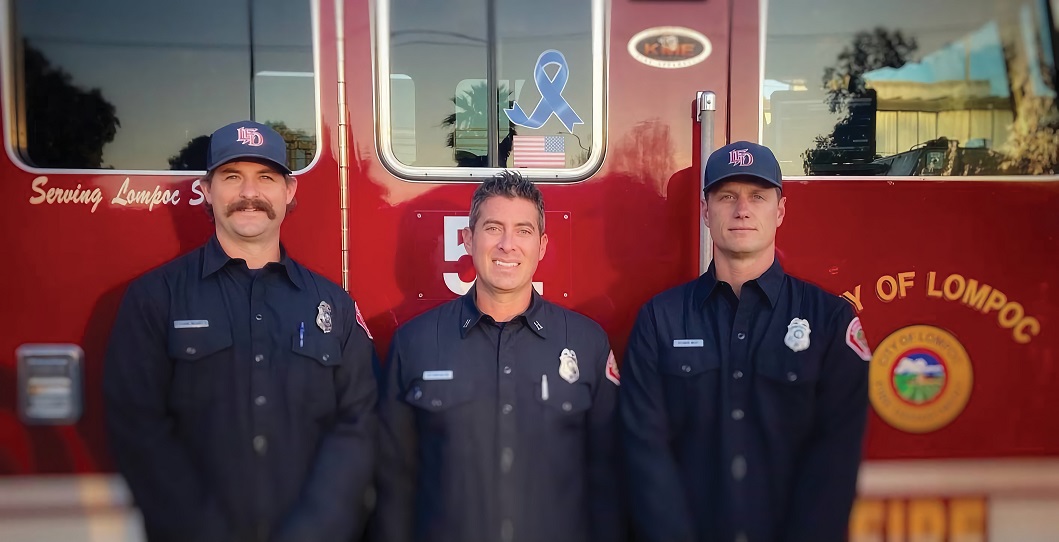Exposure to pathogens and toxins leaves firefighters at heightened risk for cancer. An annual firefighter physical flagged what turned out to be colon cancer in Lompoc Fire Captain Christopher Martinez. He’s now a survivor, and passionate advocate for the exams.

The physical demands firefighters face on the job are
extreme, impacting their safety and their health.
Exposure to pathogens and toxic elements within an
already stressful work setting leaves firefighters at
heightened risk for cancer and cardiovascular problems.
A National Institute for Occupational Safety and Health
(NIOSH) study completed in 2020 looked at 30,000
career firefighters over a 50-year period and discovered
a 9% increase in all cancer diagnoses and a 14% increase
in all cancer-related deaths. The rising cases of cancer in
younger firefighters could be linked to environmental
exposures, or to more frequent cancer screenings.
Lompoc Fire Captain Christopher Martinez is a
passionate advocate for annual firefighter physicals,
since the 2019 exam required by his own department
wound up flagging stage II colon cancer. The 44 year-old husband and father was the picture of health, a nonsmoker and healthy eater with a rigorous daily exercise
regimen and no family history of cancer. When results
from his department exam showed he was anemic,
Christopher visited his primary care physician David
Phreaner, MD. The bloodwork abnormality was puzzling
to them both since the same tests appeared completely
normal eight months earlier. The only symptom
Christopher had at that time was minor fatigue, which
as a hardworking firefighter, seemed like just a regular
part of the job. Not long after their appointment when
Christopher noticed a bloody stool, Dr. Phreaner referred
him to gastroenterologist Vincent DeRosa, MD who
performed a combined endoscopy and colonoscopy.
Those tests and a subsequent biopsy confirmed
Christopher’s colon cancer diagnosis.
Surgical oncologist W. Charles Conway, MD, FACS
removed Christopher’s tumor and said he was lucky to
have found the fast-growing malignancy before any more symptoms had begun to appear. Dr. Conway’s
warm, caring manner and attention to detail comforted
Christopher, his wife, Xochitl and sister, Laura, both
nurses at Cottage Hospital. “He listened to all of us. It
was a big weight off my shoulders,” says Christopher.
Post-surgery, Dr. Conway referred the family to RidleyTree Cancer Center, where they selected oncologist
and hematologist Mukul Gupta, MD to guide them
through treatment. They all appreciated Dr. Gupta’s
immense time investment to help them understand
the medical research and information surrounding
the diagnosis. “I felt like he gave me the opportunity
to feel empowered in the decision-making process,”
shares Christopher. When chemotherapy began,
Christopher and Dr. Gupta coordinated to try and find
the best ways for his strenuous, pre-dawn workouts to
continue. Christopher pushed through his daily
run and hundreds of push-ups despite fatigue
and nausea. “I was determined to be stronger
from this,” he recalls. A big motivator was his
daughter, Luisa, eight years-old at the time. Having
lost his mother as a third grader, Christopher longed to
protect his child from any fear or worry caused by his
illness. Oncology social worker April Calderon, MSW
met with Luisa to help her manage the stress of having
a parent with cancer. “Sometimes, kids take a lot of that
brunt. Ridley-Tree supported that aspect, so I could focus
on recovery,” explains Christopher. His patient navigator
Sam Howland, MS commanded care logistics, so he
could reap all the benefits of a multi-disciplinary center
where specialist teams rally around patients to provide
support. Oncology nutrition dietitian Sarah Washburn,
MS, RDN, CSO, personalized a diet for Christopher that
would provide adequate nutrition, while limiting any
side effects from the chemotherapy. Special attention
from Nurse Practitioner Erica Koeppen, DNP and Medical
Assistants Elizabeth Cuevas and Kathy Judy was the
icing on the cake, and made Christopher feel right at
home during his visits.
The transition into remission felt a little rocky for
Christopher, who was boosted mentally knowing he
was cancer-free, but frustrated that his stamina and
mental sharpness was taking time to return. “When
you hear about people with cancer who are in remission,
you think they are fine, they beat it, they don’t need
support,” he admits. “I struggled, but I learned this
is typical.” Dr. Gupta encouraged Christopher to be
patient since his body might need many months to be
fully-restored. Meantime, he channeled his energies
into advocacy for annual firefighter physicals for all area
fire departments. Christopher built a cancer awareness
curriculum for firefighters, used by California’s Office of
the State Fire Marshal, where he is one of only a handful
of certified behavioral health and cancer awareness instructors. He regularly presents lectures for Allan
Hancock College’s Fire Academy, and he gave a 2021
community presentation at an event co-hosted by
Ridley-Tree and Cottage Health where he inspired the
audience of Spanish speakers to stay current with their annual medical exams and cancer screening tests. With
cancer, heart disease, lung disease and infectious disease
among the leading causes of death for firefighters, there
is no time to waste, according to Christopher. “The fight
doesn’t just end, it continues. I want to address this so we
can support each other.”
Photo caption: Fire Captain Christopher Martinez (center) with Engineer Evan Nesby
and Firefighter Richard West